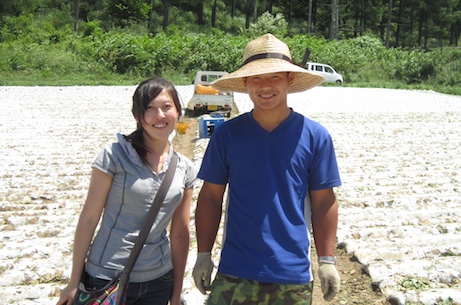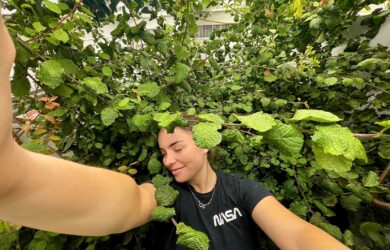
Meng Liang's research focuses on the complex relationship between Japanese farmers and Chinese migrant labourers.
Meng Liang [2010] is interested in the complexity of the relationship between Japanese employers and Chinese migrant workers.
She says the Japanese press have tended to focus on the negative and depicted the relationship as solely one of exploitation, but her research has found a much more complex and nuanced situation based on mutual dependency.
“China has a huge labour surplus and a huge population of peasants,” she says. “It supplies the highest number of migrant workers to Japan. Working in Japan they earn more than in Chinese cities. They earn around £6 an hour. They may earn in one summer as much as they would earn in a year in China.”
There are problems, for instance, over communication, but her main concern is that immigration policy and Japanese and Chinese people’s perceptions of each other need to be informed by what is actually going on the ground, not sensationalist media reports.
Her research is part of a long-held interest in the similarities and differences between Chinese and Japanese culture.
China
Meng was born in Dalian in Liaoning province, China, a former Japanese colony. Her father is a surgeon and her mother a pharmacist. At first she wanted to follow her parents into medicine, but her father suggested language studies and introduced her to a friend of his who is a professor of Japanese studies. He has been a great role model for her. He taught her about Japan and talked about his career – he had worked in Japan before returning to China. “It made me want to go to Japan and learn more and be a scholar,” says Meng.
She studied Japanese at the Dalian University of Foreign Languages, including the language, culture and literature of the country. After she left, she started a two-year masters at Nagoya University in Japan, receiving a scholarship from the Japanese government in her second year. She majored in sociology and studied how theories of Japanese identity had influenced Chinese scholars. For instance, according to the theories, Japanese people preferred to act as a group and rejected individualism in favour of the group.
“There is not much research on how such ideas have influenced the Chinese,” says Meng. She became interested in studying Chinese labour migration to Japan, how Chinese workers interacted with their Japanese employers and what the power relations were between the two groups. She says the issue was generally negatively treated in the Japanese press, with the focus being on the exploitation of Chinese workers and their working conditions. Although this may apply to some cases, but this picture neglects migrants’ agency, the complexity and dynamics of their experiences. She wanted to find out more.
Cambridge
During her masters she applied to Cambridge because she wanted her research to reach a wider audience and felt having it published in English would ensure this. She was also keen to adopt a more anthropological approach, living with the workers in order to get a less simplistic view of the relationship through real life interaction. Her supervisor at Cambridge was both a Japanese scholar and an anthropologist. In addition, she wanted to work on the issue from a neutral country and she had visited several cities in the UK through attending a workshop in Manchester during her masters and had fallen in love with Cambridge.
She started at Cambridge in 2010, doing an MPhil in Japanese Studies. Her work focused on a Japanese agricultural workers programme, the ‘Technical Internship Programme’, which worked through recruitment agencies in China to bring Chinese workers to Japan. Her focus was on the Japanese village of Kawakami in particular, which accepts more than 600 Chinese workers per year (the local population is only around 4,000). She applied halfway through for the Gates Cambridge Scholarship to do her PhD. Her fieldwork involved spending around 10 months in China and Japan. In China, she studied how workers were dispatched. Most came from rural areas of China.
In Japan she wanted to participate in workers’ daily lives, but found it hard to win their trust at the beginning. “People were quite defensive at the beginning. The employers felt I was a journalist. The workers felt I was an outsider, but eventually I became familiar face. I used my Chinese and Japanese and was careful to stay neutral,” she says.
Complex relationship
Her research found a much more complicated relationship than is suggested by Japanese newspaper headlines. The Japanese employers are largely dependent on the Chinese workers, she says, because of Japan’s demographics. “When I visited there were virtually no young Japanese people in Kawakami,” says Meng. “They rely on foreign workers, mainly from China. They need them and they welcome them. They also work with them on a daily basis, unlike if they worked in a factory. There is a lot of interaction, although not so much with the wider community. There are no obvious signs of discrimination.”
She adds that there is not much communication, though, because the Chinese workers only have basic Japanese despite some use of translators. Lack of communication can cause confusion and tension, she says. “They want to work towards a beneficial relationship, but due to their close relationship there is more opportunity for miscommunication. There is also more intimacy, particularly if they stay longer than the usual seven months.”
Workers normally get an initial work visa to stay for seven months, from April to November. Most then return to China and cannot reapply. However, if they pass a test they can extend their visa for up to three years, depending on the area they are working in.
If they stay longer, a strong relationship may be formed between worker and employer. Meng says some employers treat their workers like members of the family and, for instance, buy them laptops.
The relationship between workers and employers is also affected by growing tensions between Japanese and Chinese governments, although Meng says employers tend not to care about politics because their need for workers is greater. The Japanese tsunami, however, had a big impact as Chinese families were worried about the nuclear leak from the Fukushima nuclear reactor. Some workers left Japan and Chinese recruitment agencies have persuaded a number to return.
Meng’s work will make a number of recommendations. She says a lot of people hold very biased views about the phenomenon of Chinese migrant workers in Japan. She thinks Japanese immigration policies and public perception of both Chinese and Japanese people needs to be based on the complexities of daily reality and says this will improve the relationship of the two countries in the long term. “If they want to come up with better policies they need to understand better how things are being implemented on the ground rather than oversimplifying the issues,” she says.
She hopes to continue her studies in this area, but look in more depth at female labourers. They face more risks, she says, for instance, from sexual exploitation. Meng, who has applied for a post-doctoral fellowship at Cambridge, says: “I want to study how they negotiate these risks and how they make their choices of which risks to prioritise.”












